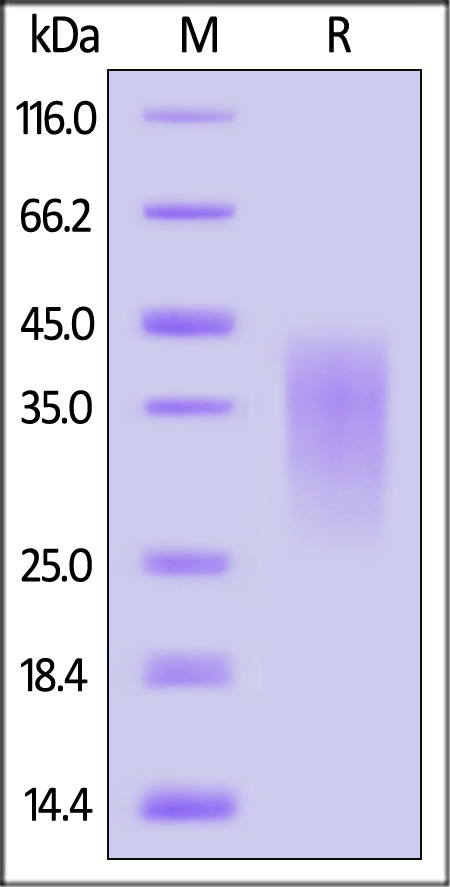分子别名(Synonym)
MIC-A
表达区间及表达系统(Source)
Biotinylated Human MICA (201-309) Protein, His,Avitag (MIA-H82E4) is expressed from human 293 cells (HEK293). It contains AA Leu 201-Thr 309 (Accession # Q29983-1).
Predicted N-terminus: Leu 201
Request for sequence
蛋白结构(Molecular Characterization)

This protein carries a polyhistidine tag at the C-terminus, followed by an Avi tag (Avitag™)
The protein has a calculated MW of 15.9 kDa. The protein migrates as 30-45 kDa under reducing (R) condition (SDS-PAGE) due to glycosylation.
标记(Labeling)
Biotinylation of this product is performed using Avitag™ technology. Briefly, the single lysine residue in the Avitag is enzymatically labeled with biotin.
蛋白标记度(Protein Ratio)
Passed as determined by the HABA assay / binding ELISA.
内毒素(Endotoxin)
Less than 1.0 EU per μg by the LAL method.
纯度(Purity)
>90% as determined by SDS-PAGE.
制剂(Formulation)
Lyophilized from 0.22 μm filtered solution in PBS, pH7.4 with trehalose as protectant.
Contact us for customized product form or formulation.
重构方法(Reconstitution)
Please see Certificate of Analysis for specific instructions.
For best performance, we strongly recommend you to follow the reconstitution protocol provided in the CoA.
存储(Storage)
For long term storage, the product should be stored at lyophilized state at -20°C or lower.
Please avoid repeated freeze-thaw cycles.
This product is stable after storage at:
- -20°C to -70°C for 12 months in lyophilized state;
- -70°C for 3 months under sterile conditions after reconstitution.
电泳(SDS-PAGE)

Biotinylated Human MICA (201-309) Protein, His,Avitag on SDS-PAGE under reducing (R) condition. The gel was stained with Coomassie Blue. The purity of the protein is greater than 90%.
SEC-MALS

The purity of Biotinylated Human MICA (201-309) Protein, His,Avitag (Cat. No. MIA-H82E4) is more than 85% and the molecular weight of this protein is around 22-30 kDa verified by SEC-MALS.
Report
背景(Background)
MHC class I polypeptide-related sequence A (MICA) belongs to the MHC class I family and MIC subfamily. MICA contains one Ig-like C1-type (immunoglobulin-like) domain. Unlike classical MHC class I molecules, MICA does not form a heterodimer with beta-2-microglobulin. MICA acts as a stress-induced self-antigen that is recognized by gamma delta T-cells. MICA is ligand for the KLRK1/NKG2D receptor. MICA bind to KLRK1 leads to cell lysis.























































 膜杰作
膜杰作 Star Staining
Star Staining












